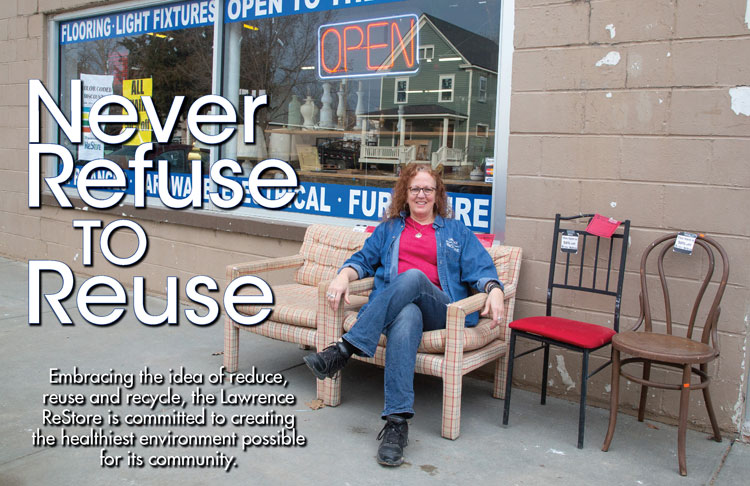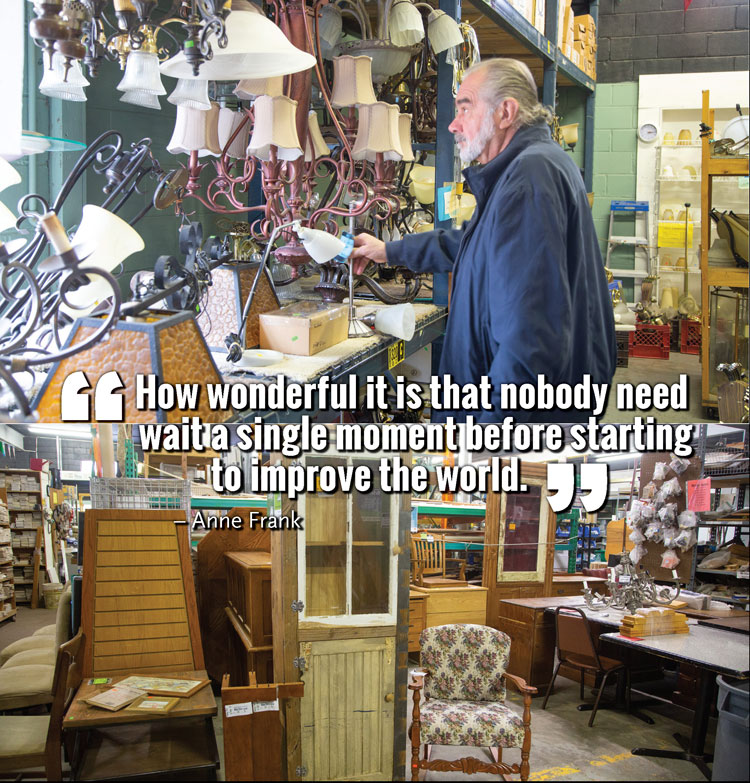Embracing the idea of reduce, reuse and recycle, the Lawrence ReStore is committed to creating the healthiest environment possible for its community.
| 2020 Q1 | story by Tyler Allen | photos by Steven Hertzog

Michele Johnson, manager of the Lawrence Habitat for Humanity ReStore sits out front the Lawrence ReStore
The practices of reducing, reusing and recycling are not new or modern. In fact, dating back to the industrial era, certain items would be used or reused to their ends, because it was cost-effective and readily available. During the 1970s, the stardom of the environmental movement would force an agenda that caused people to take better care of the spaces around them. Today, the philosophy and practice of reducing, reusing and recycling has been more pertinent than ever. Around the globe, individuals constantly seek cleaner and more sufficient environments that contribute to the health and livelihood of animals and people.
In Lawrence, there are a plethora of recycling efforts committed to developing and maintaining more sustainable environments. On the University of Kansas (KU) campus, KU Recycling (Rock Chalk Recycle) establishes bins in and outside of buildings, and uses pickup trucks to collect paper materials, cardboard, aluminum, tin and steel cans, glass jars or bottles, and plastic. In town, some restaurants use compostable napkins, cutlery, cups and straws. These items break down more naturally into waste and do not release or leave toxic residues in the environment. However, there are also businesses in town that are looking to collect waste materials much larger in size and of varying materials beyond paper and aluminum to ensure the greater good of the community.
Lawrence Habitat for Humanity ReStore, located at 708 Connecticut St., seeks to achieve its mission of “building more safe, decent and affordable homes for the residents of Douglas and Jefferson counties.” This organization is able to recycle overstocked, discontinued, new and used building materials, appliances and furniture donated by manufacturers, stores, contractors and individuals. All revenue from sales goes to the local affiliate in support of its mission. The purpose and goals of the ReStore include:
- Cover the overhead for all affiliate costs, allowing 100% of cash donations to go toward building homes.
- Keep valuable, reusable and salvageable materials out of landfills.
- Provide the community with a source of low-cost building materials, appliances and furniture.
- Create an opportunity for the community to give back by donating materials or volunteering in the store.
Starting off as an international business, the first Habitat for Humanity ReStore began in Winnipeg, Canada, in 1991. Five years later, the first United States location would open in Austin, Texas. Currently, there are more than 900 ReStores working as affiliates of Habitat for Humanity in the United States. Since 1989, Lawrence Habitat for Humanity has been able to repair more than 100 houses. With its ReStore affiliate store operating since September 2005, Lawrence Habitat for Humanity ReStore continues to repair homes with donated material and has diverted more than 370 tons of material that was potentially headed to the landfill in this past year alone. When supporting the local ReStore location by shopping, donating or volunteering, individuals are supporting the local community and helping to provide decent shelter to many around the world. Imagine the hundreds of families assisted through the building of homes and the tons of material recycled both in the United States and Canada.

Sculpture Joe Keeba looks for items at the ReStore
Michele Johnson, manager of the Lawrence Habitat for Humanity ReStore, has a personal connection with reducing, reusing and recycling. In her eyes, a key function of the ReStore is preventing items from entering the landfill. The items donated then sold at a discounted price are preserved and used. Along with that, the items donated can be used to create upcycle projects. “Some are utilitarian, and some are merely creative design projects, but all are reusing items in either their intended purpose or in an alternative way,” she explains. The Lawrence ReStore is also contributing to the local economy, as the money raised is filtered right back into the community.
Johnson has also aligned herself with the Habitat for Humanity mission in her personal projects. Ten years ago, she and her husband invested time and resources into building a project on their property, a 60- x 120-foot building that included their home and her husband’s auto repair shop. They used 30-year-old dismantled red iron from a building in Missouri. This steel (that would serve as the support for their property) came from a friend who needed to get rid of it. Once Johnson began her career at ReStore, she discovered that endless amounts of recycled materials could complete the project she and her husband started. “When I look at our home, I can easily point out all the windows, most of the doors, lighting, wood trim, kitchen cabinets, bathroom vanities, door hardware and many pieces of furniture and decorative items that came from the Lawrence ReStore,” she explains.
Recycled items that are not easily detectable are wiring, plumbing parts, structure lumber and primer paint. “We did a majority of the building ourselves, and we are happy to use the items we discovered at the ReStore. … All the money we spent at the ReStore for our supplies went to our Lawrence Habitat affiliate to build affordable homes in the Lawrence area. This is a win-win for all,” she says.
As a lover of reusing materials and saving money, Johnson feels local businesses can easily help contribute to recycling efforts. She says businesses should make an effort to research and find ways that work for them, as well as implementing recycling (whether items are donated for use or collected to keep out of waste). In these efforts, items businesses may not be able to use should be directed to other local businesses.
When Lawrence ReStore comes across items that do not typically sell, it finds a suitable location for them so they don’t go to waste. “We bring household goods to the Social Service League, unsellable metals such as nonworking appliances to a local recycle center, and we also recycle plastic, paper and cardboard through the city recycling services.” Johnson encourages others to find the right places to make their donations and find their desired goods without having to buy them brand new.
“Lawrence people seem to have a great desire to be environmentally aware and make efforts to repurpose whenever possible. With a bit of patience, it really is possible to create better habits and save at least a little bit of our precious earth.” The Lawrence Habitat for Humanity ReStore is a prime example of reducing, reusing and recycling.




